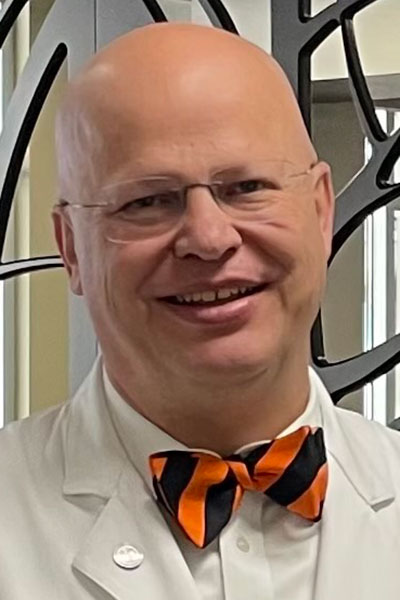Prepare for some of pulmonary and critical care medicine’s most chaotic moments in the controlled environment of high-fidelity simulation courses at CHEST 2024.

Thirty courses throughout the annual meeting will offer practical, hands-on training in the tools and techniques needed to navigate acute respiratory failure, airway bleeding, foreign body removal, and many other clinical scenarios. Backed by CHEST’s expert simulation instructors and developed at CHEST’s world-class simulation center in Chicago, these sessions deliver an unparalleled educational experience, said CHEST Live Learning Subcommittee Chair, Otis B. Rickman, DO, FCCP, Professor of Medicine at the University of Tennessee Health Sciences Center and Director of Interventional Pulmonology at Ascension Saint Thomas Chest & Lung Center.
“I think that this form of learning is the best form of learning. It mirrors how we learn in real life and in clinical practice,” Dr. Rickman said. “We don’t sit down for an hour and listen to somebody lecture us as we try to learn a concept… I have somebody supervising me, showing me how to do it. And then once you do it, and then you do it again, it solidifies the muscle memory—all the skills that it takes to translate what you know in your brain to your hands and into your actions.”
Several new sessions are adding extra interactive and immersive features to the simulation rotation for CHEST 2024. When the Puke Hits the Screen—Difficult Intubations, Sunday, October 6, from 2 pm to 5 pm ET, will be notable not only for its title but the novel methods it presents to deal with very real and very challenging contaminated airway scenarios, Dr. Rickman said. Intubate This Patient—and Fast!, offered multiple times on Monday, October 7, will further explore ICU intubation troubleshooting through a timed, team-oriented escape room—an engaging format that leans on fun to enhance the learning experience, he said.
“A lot of us physicians are competitive,” he said. “Whenever you’re competing for something, it makes people more engaged, more immersed, and raises the stakes. That will solidify the synapses a little bit more, so that skill will stick with you longer.”
Dr. Rickman said other highlights from the simulation program include, but are not limited to, multiple sessions of Awake Intubation in the ICU, Now Guideline-Based—This Is Not the Bronch Suite on Monday and Tuesday, ECMO—When to Start, When to Stop, and Everything in Between from Sunday through Tuesday, and Bronchoscopy Grand Slam—Critical Skills and Complication Management Techniques on Sunday. And don’t forget the 2 full-day simulation postgraduate courses on Saturday before the meeting, he said.
CHEST 2024 attendees can reserve a spot in any of the ticketed simulation sessions as an add-on during registration or by modifying existing registrations. Participants from any specialty and any level of training will come away from the experience with insights and skills that will propel their practice forward, Dr. Rickman said.
“It’s not only for physicians. It’s for advanced practice providers, for respiratory therapists, for physician assistants, and nurse practitioners—you name it,” he said. “Whatever course that you get into, you can be assured that you’re going to learn something, because the faculty that are doing this are expert simulation educators who will be able to tailor the experience to your learning level.”
UPDATE (September 30): Advance registration has now closed. Please inquire about simulation course availability on site in Boston at the registration desks during open hours.
Join us at CHEST 2025
Save the date for the next Annual Meeting, October 19 to 22, 2025, in Chicago. CHEST 2025 will explore the latest advancements in pulmonary, critical care, and sleep medicine, with a focus on innovation and the future, just as the city itself embodies progress and reinvention.





